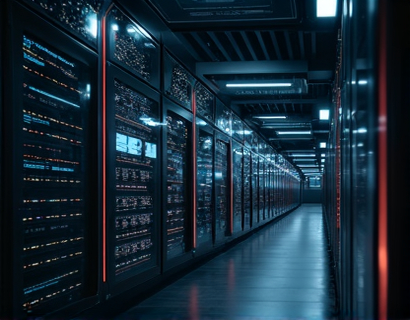Autonomous AI Agents: Revolutionizing Business Efficiency with Multi-Chain and Cross-Technology Automation Solutions
In the rapidly evolving digital landscape, businesses are constantly seeking innovative ways to enhance efficiency, reduce costs, and gain a competitive edge. One of the most transformative technologies emerging to address these needs is the integration of Autonomous AI Agents across multiple blockchains and technologies. These agents are not just a novel concept; they are a practical solution that can significantly streamline operations and optimize workflows. This article delves into the capabilities, benefits, and future potential of Autonomous AI Agents in revolutionizing business efficiency through multi-chain and cross-technology automation solutions.
Understanding Autonomous AI Agents
Autonomous AI Agents are sophisticated software entities designed to operate with a high degree of independence. These agents leverage advanced artificial intelligence and machine learning algorithms to perform tasks that traditionally required human intervention. The key feature of these agents is their ability to function seamlessly across various blockchain platforms and other technological ecosystems. This cross-chain capability ensures that businesses can integrate and automate processes that span multiple systems, thereby enhancing interoperability and reducing silos.
Multi-Chain Automation
One of the most significant advantages of Autonomous AI Agents is their multi-chain automation capability. In the past, businesses often faced challenges when trying to connect and automate processes that span different blockchain networks. Each blockchain has its own set of protocols, consensus mechanisms, and data formats, making integration complex and resource-intensive. Autonomous AI Agents bridge this gap by acting as intermediaries that understand and translate between different blockchain environments. This allows for smooth data flow and transaction execution across multiple chains, enabling businesses to leverage the unique strengths of each blockchain for specific tasks.
Enhanced Interoperability
The interoperability provided by Autonomous AI Agents is crucial for businesses operating in a decentralized and fragmented digital ecosystem. For instance, a company might use one blockchain for supply chain tracking, another for smart contracts, and a third for identity verification. With AI agents, these processes can be coordinated in real-time, ensuring that data is consistent and up-to-date across all platforms. This not only improves operational efficiency but also enhances trust and transparency among business partners.
Reduced Integration Costs
Traditional methods of integrating multiple blockchain systems often require significant investment in custom development and maintenance. Autonomous AI Agents reduce these costs by providing a standardized interface for cross-chain interactions. Businesses can deploy these agents once and use them across various blockchain networks, eliminating the need for repeated development efforts. This standardization also simplifies maintenance and updates, as changes need to be made only at the agent level rather than across multiple systems.
Cross-Technology Automation
Beyond blockchain, Autonomous AI Agents are capable of automating tasks across a wide range of technologies, including but not limited to, IoT devices, cloud services, and traditional enterprise applications. This cross-technology automation ensures that businesses can create a cohesive and integrated operational environment. For example, an AI agent can monitor real-time data from IoT sensors, process this data using cloud-based analytics, and trigger actions in enterprise software applications, all without human intervention.
Real-Time Data Processing
One of the core strengths of Autonomous AI Agents is their ability to process and act on real-time data. In a fast-paced business environment, delays in data processing can lead to missed opportunities and inefficiencies. AI agents can continuously monitor data streams from various sources, analyze them using advanced algorithms, and execute predefined actions instantaneously. This real-time responsiveness is particularly valuable in industries such as finance, where timely decision-making can significantly impact outcomes.
Predictive Maintenance
In manufacturing and logistics, predictive maintenance is a critical application of cross-technology automation. Autonomous AI Agents can collect data from IoT devices monitoring equipment health, analyze this data to predict potential failures, and schedule maintenance proactively. This not only reduces downtime but also optimizes maintenance costs by avoiding unnecessary repairs. The integration of blockchain can further enhance this process by providing a tamper-proof record of maintenance activities and equipment statuses, ensuring transparency and accountability.
Benefits of Autonomous AI Agents
The adoption of Autonomous AI Agents brings a multitude of benefits to businesses, making them an attractive solution for those looking to enhance efficiency and competitiveness.
Increased Productivity
By automating repetitive and complex tasks, Autonomous AI Agents free up human resources to focus on higher-value activities. This shift not only increases overall productivity but also improves job satisfaction by allowing employees to engage in more meaningful work. The efficiency gains are substantial, as AI agents can operate 24/7 without breaks, ensuring continuous process execution.
Cost Reduction
Automation through AI agents leads to significant cost savings. The reduction in manual labor and the elimination of integration overheads result in lower operational expenses. Additionally, the predictive capabilities of AI agents help in optimizing resource usage, further reducing waste and inefficiencies. Over time, these cost savings can be substantial, contributing to improved profit margins and financial stability.
Enhanced Decision-Making
Autonomous AI Agents provide businesses with access to real-time, accurate data and insights. This data-driven approach enables more informed decision-making, reducing the risk of human error and bias. AI agents can analyze vast amounts of data from multiple sources, identify patterns, and provide actionable recommendations. This capability is particularly valuable in strategic planning and risk management, where timely and accurate insights can make a significant difference.
Improved Customer Experience
The efficiency and reliability of Autonomous AI Agents translate into better customer experiences. For instance, in e-commerce, AI agents can manage inventory in real-time, ensuring that products are always available when customers want them. In customer service, AI agents can handle a high volume of inquiries and issues, providing quick and consistent responses. This level of service not only enhances customer satisfaction but also builds brand loyalty.
Challenges and Considerations
While the benefits of Autonomous AI Agents are clear, there are several challenges and considerations that businesses should be aware of when implementing these solutions.
Security Concerns
Security is a paramount concern when integrating AI agents across multiple technologies and blockchains. Ensuring the integrity and confidentiality of data is crucial, especially when dealing with sensitive information. Businesses must implement robust security measures, such as encryption, access controls, and regular security audits, to protect against potential threats. Additionally, the decentralized nature of blockchain adds another layer of complexity, requiring careful management of permissions and access rights.
Regulatory Compliance
The regulatory landscape for AI and blockchain is still evolving, and businesses must navigate these changes carefully. Compliance with data protection laws, such as GDPR, and industry-specific regulations is essential. Autonomous AI Agents must be designed and deployed in a way that adheres to these regulations, ensuring that businesses avoid legal risks and maintain customer trust.
Technical Expertise
Implementing Autonomous AI Agents requires a certain level of technical expertise. Businesses need to invest in training their IT staff or partner with experts who can design, deploy, and maintain these agents effectively. The complexity of cross-chain and cross-technology integration demands a deep understanding of both AI and blockchain technologies, as well as the specific requirements of the business domain.
Future Prospects
The future of Autonomous AI Agents in business efficiency is promising, with several emerging trends and advancements poised to further enhance their capabilities and adoption.
Advancements in AI and Machine Learning
Continuous advancements in AI and machine learning are making AI agents more sophisticated and capable. Techniques such as reinforcement learning and deep learning are enabling agents to learn from their environment and improve their performance over time. This evolution will lead to more intelligent and adaptive agents that can handle increasingly complex tasks and make more nuanced decisions.
Expansion to New Industries
As the technology matures, the application of Autonomous AI Agents is expanding beyond traditional sectors like finance and manufacturing to new industries such as healthcare, education, and retail. In healthcare, AI agents can automate patient monitoring, drug discovery, and personalized treatment plans. In education, they can personalize learning experiences and manage administrative tasks, enhancing both student outcomes and operational efficiency.
Integration with Emerging Technologies
The integration of Autonomous AI Agents with other emerging technologies, such as 5G, edge computing, and quantum computing, will further amplify their potential. 5G and edge computing can provide the necessary bandwidth and processing power for real-time data handling, while quantum computing could revolutionize the computational capabilities of AI agents, enabling them to solve complex problems more efficiently.
Conclusion
Autonomous AI Agents represent a significant leap forward in business efficiency, offering a powerful solution for automating complex tasks and optimizing workflows across multiple blockchains and technologies. By enhancing interoperability, reducing costs, and providing real-time insights, these agents are poised to transform how businesses operate in the digital age. While there are challenges to consider, the potential benefits make the investment in Autonomous AI Agents a strategic imperative for businesses aiming to stay competitive and innovative. As the technology continues to evolve, the future looks bright for those who embrace this transformative approach to automation.










































